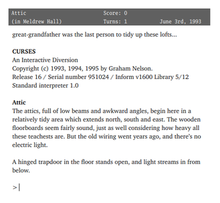Curses (video game)
| Curses | |
|---|---|
 Curses being played in a modern interpreter. | |
| Developer(s) | Graham Nelson |
| Publisher(s) | Self published |
| Designer(s) | Graham Nelson |
| Engine | Z-machine |
| Platform(s) | Z-machine |
| Release | 1993 |
| Genre(s) | Interactive Fiction, Adventure |
| Mode(s) | Single player |
Curses is an interactive fiction computer game created by Graham Nelson in 1993. Appearing in the beginning of the non-commercial era of interactive fiction, it is considered one of the milestones of the genre.
Writing for The New York Times, Edward Rothstein described the game as "acclaimed."[1]
Plot
[edit]
The player plays the part of the current owner of Meldrew Hall. In the course of searching the attic for an old tourist map of Paris, the protagonist steps into a surreal adventure to uncover a centuries-old curse that has been placed on the Meldrew family. The goal of the game is to find the missing map, and thus annul the curse.
Development
[edit]Curses was originally developed on an Acorn Archimedes using Acorn C/C++, before Nelson moved to his Inform programming language, which was simultaneously released.[2][3] It was the first non-test game developed in the language.[3] It is distributed without charge as a Z-Code executable. The Inform source code is not publicly available.
Innovations
[edit]Curses contains some innovations that contribute to its appeal.
- Managing the player's inventory by automatically placing items in a container to make room for an object needed in hand (such as placing an item in the rucksack when reading an entry in a book), eliminating the tedium of having to manually drop one item before picking up another.
- Commands places and objects, displaying all the locations visited and all the objects seen during the game.
See also
[edit]- Jigsaw, another Graham Nelson game, from 1995
References
[edit]- ^ Rothstein, Edward (1998-04-06). "TECHNOLOGY: CONNECTIONS; In the intricacy of a text game, no object is superfluous, no formulation too strange". The New York Times. Archived from the original on 2012-11-08. Retrieved 2008-11-13.
- ^ Montfort, Nick (2005). "7 The Independents". Twisty little passages : an approach to interactive fiction. Cambridge, Massachusetts, United States: MIT Press. ISBN 0-262-63318-3.
Before Nelson began work on Inform [...] Using an Acorn Archimedes and programming in ANSI C, he quickly abandoned his small game to begin developing Curses, using that to put the in-progress compiler through its paces.
- ^ a b "Interview: Graham Nelson". XYZZY News. Eileen Mullin. Archived from the original on 2002-02-24. Retrieved 2002-02-24.
I use two languages, the excellent Norcroft ANSI C compiler and Inform.
External links
[edit]- Curses in the Interactive Fiction Database; the entry has some coverage, reviews, and links to both the original release (version 7) and the most recent one (version 16)
